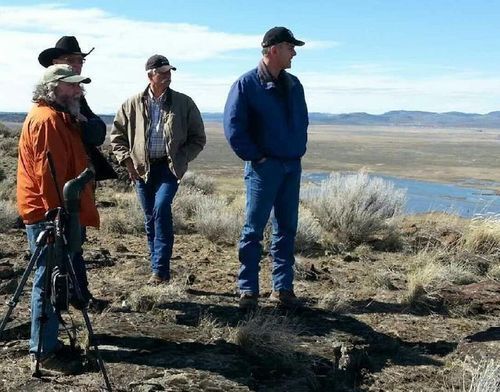Bob Sallinger, Willamette Riverkeeper Urban Conservation Director

Bob Sallinger (orange jacket) in the early days of HDP with from left to right Gary Marshall,
Dan Nichols and Chad Karges taking in the Harney Basin.
The world lost Bob in 2024 and we will always feel his loss here at HDP; he has been with us since the beginning when the vision for HDP was just coming to life. Bob epitomized what it was to work together on some really complex ecological issues and he's left a deep legacy here in Harney County. He brought such vision, passion and the beautiful ability to tell stories that engaged and welcomed people in. Bob taught us so much, probably more than we realized at the time. His influence powerfully shaped not just the collaborative work we do, but the very way we approach our relationships with one another.
Following is a profile of Bob from Fall 2022.
"One of the first experiences I had during a meeting at Malheur was, they asked us to line up by length of involvement and so I put myself at the end of the line as I thought I was the new person having just come into my job. But the refuge manager at the time said ‘Bob, you've been involved for well about 30 minutes now but your organization, Audubon, has been involved a little bit longer.’ So, he said, ‘how long has your organization been involved?’ And I said really, since our founding in 1902. So, he sort of grabbed me by the shoulders and marched me down to the other end of line and put me after the Burns Paiute Tribe and descendants of the early homesteaders. This was a powerful reminder that I am working with an organization that's been investing time, energy and resources out here for a very long time."
Bob Sallinger was the Conservation Director with Portland Audubon for 30 years having retired in 2023; it all started in 1992 with his girlfriend at the time and now wife, who found an injured Prairie Falcon. They took it to the wildlife hospital at Portland Audubon and "I wound up staying and volunteering, then was hired as temporary staff, and wound up running the animal hospital for about 15 years and have now been leading the conservation program for the last 15 years."
Bob's tenure with Portland Audubon's conservation program began around the time that HDP got its start. In fact, Bob was one of the early voices instrumental in the collaborative effort behind the Malheur National Wildlife Refuge's Comprehensive Conservation Plan. "What was interesting when I took over the policy work at Portland Audubon, we were very focused on forest issues but they are certainly not the whole picture when you think about bird conservation. And so one of the things that I wanted to do when I became conservation director was reconnect with bird conservation statewide. And in particular, I wanted to reconnect with places like Malheur and Klamath that are so important to birds, but which also are under significant threat. It just so happened that around that same time, the collaborative effort was just taking off in Harney County, and Bruce Taylor [with Defenders of Wildlife at the time] called me up and said Bob, you know, we're starting this effort out in Malheur and you need to be there. It involves the refuge, the ranchers, elected officials, the Burns Paiute Tribe and we're trying to take a different kind of approach out here, a more collaborative approach. It was very, very serendipitous that this came in almost at exactly the moment I was taking over the program and trying to shift our priorities a little bit to places like Malheur. So, I jumped at the opportunity."
"Plus, I just love the landscape, it's just such an incredible place." Bob is based in western Oregon in Portland and in a pre-video conferencing world he made a personal commitment to attend all of the meetings in person. He believes that it is critical with these types of collaborative efforts to really get to know individuals, the community and recognizes that a lot of conversations happen outside of meetings. Bob half jokes that the refuge's Comprehensive Conservation Plan was largely developed over shots of whiskey at the Pine Room. "My family was young at that time, so they used to often come with me to Harney County. In fact, that was probably the place they went to most often, second only to their grandparents. I look back at old pictures of those meetings and my kids are always in the background."
Bob and Audubon have been and are important partners within the Malheur National Wildlife Refuge Comprehensive Conservation Plan Collaborative and the Harney Basin Wetlands Collaborative. Bob is actively involved with both collaboratives and Audubon has invested in a Field Coordinator, Teresa Wicks who makes her home in Harney County. Bob is 'collaborating lifer' you could say and while HDP collaboration is built around finding common ground he recently shared some wisdom around that. "I think we've demonstrated that we can disagree and still continue moving forward. Sometimes people in collaboratives focus simply on what you agree upon. But I think really sometimes the true test of collaboration is whether you're able to disagree and still move forward. Are you able to continue to see enough value in those collaborative efforts and have you built enough trust that, even though you disagree, you are able to transcend those disagreements and still work together. You know, it doesn't mean you ignore them, it means that you keep talking."

